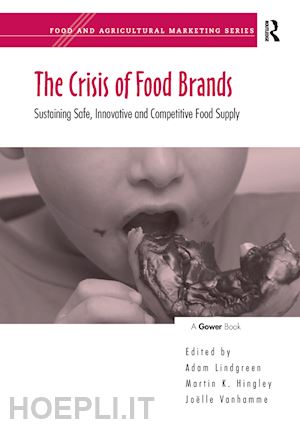Contents: Foreword; Part 1 Food Crisis and Responsibility: The Dasani controversy: a case study of how the launch of a new brand jeopardised the entire reputation of Coca-Cola, Conor Carroll; Cadbury's salmonella scare: good or bad crisis management?, Conor Carroll; Risk communication and food recalls, Sylvain Charlebois and Lisa Watson; Food safety, quality, and ethics in supply chains: a case study of informing in international fish distribution, Per Engelseth, Takeo Takeno and Kristian Alm; Is fresh milk powdered milk? The controversy over packaged milk in Vietnam, Virginie Diaz Pedregal and Nguyen Ngoc Luan. Part 2 Agri-Food Systems, Product Innovation, and Assurance: Quality assurance schemes and food marketing in the European Union, Stephan Hubertus Gay, Fatma Handan Giray, Pénélope Vlandas and Monique Libeau-Dulos; Organic versus conventional farming: a marketing survey on wine production, Frederica Cisilino and Luca Cesaro; Critical aspects of consumption of genetically modified foods in Italy, Marco Platania and Donatella Privitera; Solving the controversy between functional and natural food: is agrifood production becoming modular? Roberto Esposti; Controversies in managing competencies: the case of development and launching new functional food products, Jofi Puspa, Tim Voigt and Ranier Kühl; Is there a real health versus taste or price controversy in food marketing? The case of functional foods, Athanasios Krystallis, Michael Linardarkis and Spyridion Mamalis. Part 3 The Consumer View: Controversies in food and agricultural marketing: the consumer's view, Keith Walley, Paul Custance and Stephen Parsons; Consumer preferences for food quality: a choice experiment regarding animal welfare and food safety in chicken, Morten Raun Mørkbak, Tove Christensen and Berit Hasler; Consumer demand for ethically improved animal production systems, Ana Isabel Costa and John Cone; Beyond the marketing mix: modern food marketing and the future of organic food consumption, Hans Dagevos; Green consumerism: what can we learn from environmental valuation surveys?, Meike Henseleit. Part 4 Fair Engagement?: The elusive written contract: dependence, power, conflict, and opportunism within the Australian food industry, Melina Parker and John Byrom; Are supermarkets poor-friendly? Debates and evidence from Vietnam, Paule Moustier, Muriel Figuié, Dao The Anh and Nguyen Thi Tan Loc; An appraisal of the fair trade system: evidence from small producers in emerging countries, Luciana Marques Vieira and LuÃs Kluwe Aguiar; Index.











